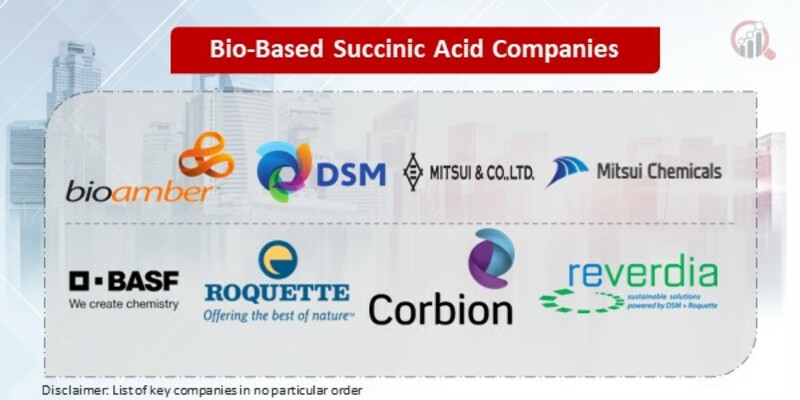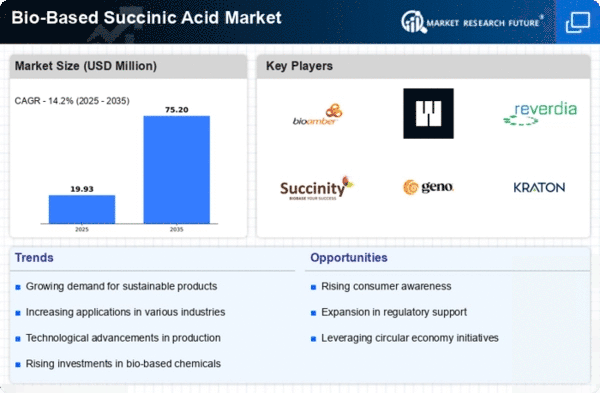Top Industry Leaders in the Bio-Based Succinic Acid Market

The bio-based succinic acid market, a beacon of sustainability in the chemical industry, is poised for a luminous ascent. But navigating this landscape requires understanding the intricate dance of strategies, factors influencing market share, and the constant evolution of industry news and developments.
Competitive Strategies Shaping the Landscape:
-
Industry Leaders: Companies like Myriant Corporation, BASF, CJ Bio, and Mitsubishi Chemical hold the reins with established production capacities, diverse product portfolios, and a global reach. Their strategies revolve around continuous R&D for new applications, strategic partnerships, and vertical integration to control the supply chain. -
Regional Powerhouses: Regional players like PTT Global Chemical in Thailand and Roquette Frères in Europe hold strong positions in their respective markets. They capitalize on cost-effective production, cater to regional preferences, and build strong local distribution networks. -
Sustainable Innovators: Emerging players like BioAmber and succinic acid derivatives startups like Reverdia carve niches with differentiated technologies and a focus on specific applications. They capitalize on unique capabilities and cater to environmentally conscious customers, often commanding premium prices.
Factors Dictating Market Share:
-
Production Technology and Cost Competitiveness: Developing efficient and cost-competitive fermentation technologies for bio-based succinic acid production is crucial for gaining market share. Achieving economies of scale and optimizing downstream processes are key considerations. -
Product Diversification and Application Development: Offering a diverse range of succinic acid derivatives like bioplastics, lubricants, and solvents catered to various applications like packaging, pharmaceuticals, and cosmetics attracts a wider customer base and increases market share. -
Sustainability and Environmental Impact: Adhering to environmental regulations and showcasing the life cycle assessment benefits of bio-based succinic acid compared to petroleum-based alternatives addresses environmental concerns and opens doors to new markets. -
Regional Growth and Emerging Applications: Identifying high-growth regions like Asia-Pacific and catering to emerging applications like renewable energy and biocomposites presents significant market share opportunities. -
Government Policies and Incentives: Government support through favorable policies, subsidies, and research grants can significantly boost the adoption of bio-based succinic acid, impacting market share dynamics.
Key Players:
- BioAmber Inc (US),
- DSM (Netherlands),
- Mitsui & Co., Ltd (Japan),
- Mitsubishi Chemical Corporation (Japan),
- BASF SE (Germany),
- Roquette Frères (France),
- Corbion (The Netherlands), and
- Reverdia (Netherlands)
Recent Developments:
-
September 2023: CJ Bio partners with a major consumer goods company to develop bio-based cosmetics ingredients from succinic acid, showcasing the versatility of the material in personal care applications. -
October 2023: Mitsubishi Chemical acquires a leading bio-based succinic acid startup, strengthening its position in the market and accelerating its R&D efforts. -
November 2023: A team of researchers at MIT develops a genetically modified microorganism that efficiently produces succinic acid from renewable feedstocks, paving the way for even more sustainable production processes. -
December 2023: The European Union proposes legislation mandating the use of a certain percentage of bio-based chemicals in various products, creating a significant market boost for bio-based succinic acid.











